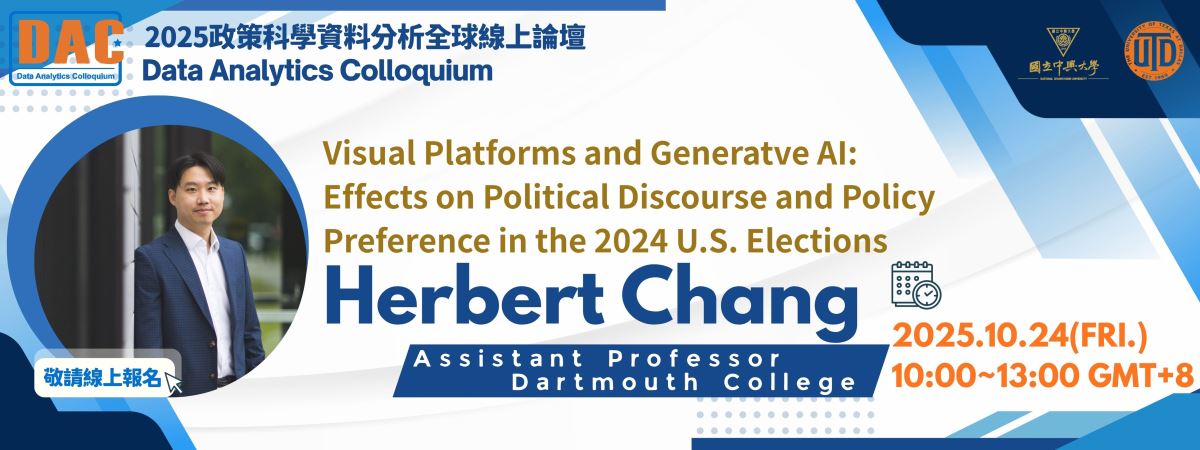- NEWS最新消息
NEWS最新消息
2025/10/14
【114.10.24】 政策科學資料分析全球線上論壇~2025系列講座 Visual Platforms and Generatve AI: Effects on Political Discourse and Policy Preference in the 2024 U.S. Elections
Dr. Herbert Chang
(Assistant Professor of Dartmouth College)
Date:Friday, October 24 - 10:00AM~13:00PM (Taiwan Time, GMT+8)
Topic:Visual Platforms and Generatve AI: Effects on Political Discourse and Policy Preference in the 2024 U.S. Elections
Registration:https://reurl.cc/Oml6WA(歡迎事先報名、註冊,填寫NCHU-姓名)
Webinar:(待通知)
 Abstract:
Abstract:
Herbert Chang is an Assistant Professor of Quantitative Social Science, Computer Science, and Mathematics at Dartmouth College, and a Forbes Under 30 Honoree in Science. His research studies how emerging technologies impact democratic behavior. He has published more than 35 peer-reviewed articles on misinformation, social networks, and the political impact of AI systems. His work has been featured in the New York Times, Washington Post, and Scientific American.
Description:
Visual Platforms and Generative AI: Effects on Political Discourse and Policy Preference in the 2024 U.S. Elections
The 2024 U.S. elections marked a pivotal moment in the use of generative AI to create and disseminate political (mis)information. Across three studies, we examine the role of visual content on TikTok and Instagram and the influence of AI-generated media on policy preferences. Drawing on 239,526 Instagram images collected over seven months, we use zero-shot labeling, deep learning, and OpenAI’s generative classifier to identify synthetic content and visual themes. We find that AI-generated visuals alone do not increase engagement, but their combination with traditional memes substantially boosts reach. Republicans more often employ generative AI for out-group attacks, while Democrats use it for in-group reinforcement. Building on these findings, a large-scale survey experiment conducted four days before the election tests whether AI-generated visuals shift policy preferences. Using conjoint and framing designs with randomly assigned text and images across issues (abortion, tax, Gaza) and candidates (Trump, Harris), we observe significant within-subject switching toward Harris’s abortion stance and Trump’s immigration stance, reflecting hot cognition and partisan alignment. We conclude by discussing implications for election integrity, targeted misinformation, and the methodological advantages of integrating LLM workflows with survey experiments to enable rapid, ecologically valid research during high-stakes political events.